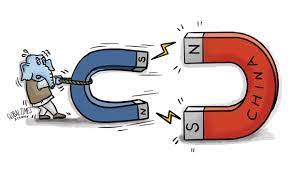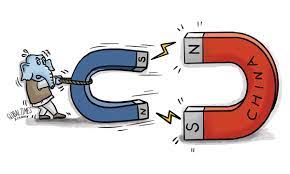
Amid the hoopla surrounding US Vice President Joe Biden's new Indo-Pacific strategy, China went unnoticed and conducted a high-level meeting on RCEP, the world's largest trade treaty.
It happened only days after the Biden administration unveiled the Indo-Pacific Economic Framework, or IPEF – a 13-country cooperation, excluding China, as the US aims to strengthen its political and economic leadership in the Indo-Pacific area.
Analysts expect China will press ahead with agreed-upon trade pacts and capitalise on ready-to-go tariffs and market accesses rather than reacting to or resisting IPEF.
“China will not take immediate or very targeted measures to respond to the IPEF,” said Li Xirui, a trade scholar at the S. Rajaratnam School of International Studies at Singapore’s Nanyang Technological University.
Non-government trade specialists from throughout the region convened at the second RCEP Media & Think Tank Forum, held in the Hainan capital of Haikou the weekend after IPEF was announced, to examine additional ways to enhance commerce inside the bloc.
China is expected to continue encouraging RCEP adoption since it provides member countries with massive market access, which IPEF lacks. The RCEP includes China, the 10-member ASEAN group, Australia, Japan, South Korea, and New Zealand.
The meeting, led by the Hainan government, also marked another provincial effort to match Beijing's broader aim of implementing RCEP since its debut at the beginning of this year.
“Consistent with its support of multilateralism and globalization, China is likely to continue promoting the adoption of RCEP as this grants member states huge market access, which IPEF lacks,” Li said.
She predicted that China would respond to the US on any future Asia-Pacific economic incursions by strengthening its economic control in the area and increasing trade under the RCEP.
Beijing would also work on applications to join other large-scale trade agreements, such as the Comprehensive and Progressive Agreement for Trans-Pacific Partnership (CPTPP) and the Digital Economy Partnership Agreement (DEPA), according to Li.
China's strategy will be consistent with how other countries and political analysts interpret the IPEF — a non-trade agreement and Biden's geopolitical rather than economic shift back towards Asia Pacific, according to Li.
Following the announcement of the IPEF in late May, former Malaysian Prime Minister Mahathir Mohamad denounced the Indo-Pacific agreement, claiming it was a political ploy by the US to isolate China.
Malaysia is one of 13 countries that have joined the IPEF, which excludes China.
The RCEP is the only megaregional trade deal to which China is a participant, and it is likely that China will highlight it.
Heng Wang, a trade specialist at the University of New South Wales' Herbert Smith Freehills China International Business and Economic Law (CIBEL) Centre, believes that China would continue to leverage market access granted under RCEP since it will allow it to extend its footprint in the area.
“RCEP is the only mega regional trade agreement to which China is a party, and China would likely highlight it,” Wang said.
However, the potential of a competing trade agreement by the United States remains, according to Henry Gao, associate professor of law at Singapore Management University.
“In case anyone doubts the U.S. vision of the IPEF as the RCEP-killer, the White House stated explicitly in the [IPEF] announcement, that: ‘Together, we represent 40% of world GDP,’” Gao said.
“Why [use] this statement when the IPEF isn’t supposed to be about market access?”
Gao drew attention to the symmetry of comments made by RCEP members, particularly China, who have been touting the fact that the RCEP accounts for 30 per cent of global GDP.
Meanwhile, China has made progress in implementing the RCEP since its inception in January, according to Li.
It outlined a strategy for Chinese enterprises to grow trade and locate opportunities through RCEP.
Beijing established recommendations in six areas, including commerce and manufacturing, and advocated the use of the Chinese yuan for trading settlement. Authorities also urged enterprises to use its extensively advertised free-trade port in Hainan, which was putting in place an independent customs system.
According to Li, who has been following China's RCEP implementation, at least eleven provinces, including Fujian and Zhejiang, have detailed plans to employ the RCEP.
(Source:www.cnbc.com)
It happened only days after the Biden administration unveiled the Indo-Pacific Economic Framework, or IPEF – a 13-country cooperation, excluding China, as the US aims to strengthen its political and economic leadership in the Indo-Pacific area.
Analysts expect China will press ahead with agreed-upon trade pacts and capitalise on ready-to-go tariffs and market accesses rather than reacting to or resisting IPEF.
“China will not take immediate or very targeted measures to respond to the IPEF,” said Li Xirui, a trade scholar at the S. Rajaratnam School of International Studies at Singapore’s Nanyang Technological University.
Non-government trade specialists from throughout the region convened at the second RCEP Media & Think Tank Forum, held in the Hainan capital of Haikou the weekend after IPEF was announced, to examine additional ways to enhance commerce inside the bloc.
China is expected to continue encouraging RCEP adoption since it provides member countries with massive market access, which IPEF lacks. The RCEP includes China, the 10-member ASEAN group, Australia, Japan, South Korea, and New Zealand.
The meeting, led by the Hainan government, also marked another provincial effort to match Beijing's broader aim of implementing RCEP since its debut at the beginning of this year.
“Consistent with its support of multilateralism and globalization, China is likely to continue promoting the adoption of RCEP as this grants member states huge market access, which IPEF lacks,” Li said.
She predicted that China would respond to the US on any future Asia-Pacific economic incursions by strengthening its economic control in the area and increasing trade under the RCEP.
Beijing would also work on applications to join other large-scale trade agreements, such as the Comprehensive and Progressive Agreement for Trans-Pacific Partnership (CPTPP) and the Digital Economy Partnership Agreement (DEPA), according to Li.
China's strategy will be consistent with how other countries and political analysts interpret the IPEF — a non-trade agreement and Biden's geopolitical rather than economic shift back towards Asia Pacific, according to Li.
Following the announcement of the IPEF in late May, former Malaysian Prime Minister Mahathir Mohamad denounced the Indo-Pacific agreement, claiming it was a political ploy by the US to isolate China.
Malaysia is one of 13 countries that have joined the IPEF, which excludes China.
The RCEP is the only megaregional trade deal to which China is a participant, and it is likely that China will highlight it.
Heng Wang, a trade specialist at the University of New South Wales' Herbert Smith Freehills China International Business and Economic Law (CIBEL) Centre, believes that China would continue to leverage market access granted under RCEP since it will allow it to extend its footprint in the area.
“RCEP is the only mega regional trade agreement to which China is a party, and China would likely highlight it,” Wang said.
However, the potential of a competing trade agreement by the United States remains, according to Henry Gao, associate professor of law at Singapore Management University.
“In case anyone doubts the U.S. vision of the IPEF as the RCEP-killer, the White House stated explicitly in the [IPEF] announcement, that: ‘Together, we represent 40% of world GDP,’” Gao said.
“Why [use] this statement when the IPEF isn’t supposed to be about market access?”
Gao drew attention to the symmetry of comments made by RCEP members, particularly China, who have been touting the fact that the RCEP accounts for 30 per cent of global GDP.
Meanwhile, China has made progress in implementing the RCEP since its inception in January, according to Li.
It outlined a strategy for Chinese enterprises to grow trade and locate opportunities through RCEP.
Beijing established recommendations in six areas, including commerce and manufacturing, and advocated the use of the Chinese yuan for trading settlement. Authorities also urged enterprises to use its extensively advertised free-trade port in Hainan, which was putting in place an independent customs system.
According to Li, who has been following China's RCEP implementation, at least eleven provinces, including Fujian and Zhejiang, have detailed plans to employ the RCEP.
(Source:www.cnbc.com)





